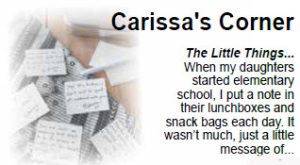 By: Detri McGhee
By: Detri McGhee
Emotional intelligence (EI) has become a huge buzzword among those seeking to help us all live better, more well-rounded, contented lives. EI is, simply put, the ability to both mange your own emotions for your best life results, and to understand the emotions of people around you, so you and they both attain your highest life-experiences.
If you are not familiar with EI and its application to people of all ages and stations in life, I hope you will take a moment to familiarize yourself with this exciting concept. Just google it and you will find more information you want, but much you will benefit from absorbing. Criticism Management, my area of expertise, is a fundamental component of this skill.
In case you missed the first three articles, we previously walked through some ways “doses” of criticism are like “doses” of medicine. To re-cap, here are a few:
1. Proper administration is important: Dosage & method. (Remember Phenergan?)
2. Either can be meant to save or take lives; to heal or harm.
3. They can be delivered by friend or foe, or even uninvolved stranger.
4. The wrong dosage can be destructive, no matter how well intended.
5. Just because it worked for others, doesn’t mean it is right for you.
6. No matter who prescribes it for you, you are not required to take it.
7. Even if everyone else participates, even raves about it, it is important that you consider how it affects YOU. (I can relate this to statin drugs!)
Hopefully, as we expounded on those analogies in the earlier three articles, you got the picture on how they reflect each other’s characteristics. Each “dose” will be expounded upon in my up-coming book. I am constantly amazed at how other people, as well as I myself, are coming up with more similarities at every workshop. If you want an expanded explanation of any point, please contact me at detrimcghee@gmail.com or check out www.criticismmanagement.com. I’ll be happy to share.
That I would like to focus on for the remainder of this article are the two basic categories of Criticism Managers: #1 – Those who ignore criticism and #2 – Those who let criticism control them.
Manager #1: The Ignorer — This type of personality simply doesn’t SEE well with their emotional eyes. They will not really listen to criticism, no matter who, what, when, how, why, or where it is sourced. By merely ignoring it, or dismissing it as “not my problem,” they miss the exquisite joy of maturing into a balanced human being who brings blessings to everyone around them. These Ignorers also miss the greatest blessings of all…because they not only have missed their own blessings, but cannot experience the joy of everyone else’s blessings. They miss the magnificent blessings of Vicarious Joy! These people are usually also very self-centered, lack a balance of being able to admit a mistake, they blame everything on everyone and everything else (but themselves), and tend to explode and fight back
unfairly when confronted with any kind of message even slightly perceived as criticism. They also tend to be very negative, complaining, fault-finding, and surprisingly thin-skinned themselves.
As Grandpappy might have said: “Them what’s can dish it out, jus’ can’t take it!” These folks often are the first and loudest to complain about everyone else when everyone else is simply acting just like THEY act. All the while they excuse themselves as they condemn everyone else.
Manager #2: The Incapacitated — These people are so sensitive to each and every real or perceived criticism that they over-analyze, exaggerate, tend to crawl in a shell and “never try again,” and become consumed with nursing wounds over the “wrong” done to them. These temperaments will let simple negative remarks stop them from following their heart’s dreams. The stronger these reactions are, the easier these people are to be manipulated, and controlled by others. They tend to avoid confrontation no matter what, and often realize too late that they didn’t stand up for others or themselves as they should have.
The GOOD NEWS? Most of us are a little of both, depending on the person, relationship, and importance of the situation (or criticism). I had a boss once who was a real jerk to most of the people in his office, but he treated his wife like a queen, and was an attentive and kind father. Having different temperaments with different situations is more typical than not. We are many people, not just one. We act and react differently with our parents than with our boss; differently with our spouse than with our doctor; differently with the janitor than with the governor. When you reach a point where you are as kind and gracious to the janitor as you are to the person you are trying to impress, you will realize that you are making great strides toward becoming an Emotional Intelligence GENIUS. Be blessed!!!
www.criticismmanagement.com
By: Detri McGhee – Certified Life Underwriter, Chartered Financial Counselor






